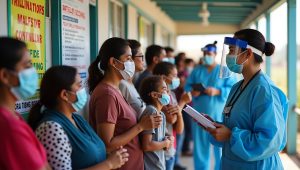
The COVID-19 pandemic has not only disrupted lives but also exacerbated the existing inequalities in healthcare, especially for low-income families. These families often face barriers to accessing quality healthcare, and the pandemic has only made it harder for them to get the support they need. Affordable COVID health support is vital for ensuring that everyone, regardless of their financial situation, has the opportunity to stay healthy and safe during these challenging times.
The Impact of COVID-19 on Low-Income Families
Low-income families are particularly vulnerable to the impacts of COVID-19 for several reasons. First, many of them work in essential jobs, putting them at higher risk of exposure to the virus. Additionally, financial constraints may prevent these families from seeking medical care when they need it. Without adequate insurance coverage, even basic healthcare services can become prohibitively expensive, and the fear of incurring medical debt often leads individuals to avoid seeking help until it is too late.
Furthermore, low-income families are more likely to live in crowded conditions, making social distancing and quarantine difficult. Access to healthcare services, such as testing, treatment, and vaccination, may also be limited, especially in underserved communities. These factors collectively increase the risk of both contracting and spreading COVID-19.
Affordable Healthcare Solutions
Governments and organizations have taken steps to address these disparities and provide affordable COVID-19 health support to low-income families. Several initiatives have been introduced to reduce healthcare costs and ensure that everyone has access to necessary care.
-
Free Testing and Vaccination
In many countries, free COVID-19 testing and vaccination programs have been implemented. These services are essential for identifying infections and preventing further spread, especially among vulnerable populations. For low-income families, these programs remove financial barriers, allowing them to access critical resources without the fear of high medical bills. -
Telehealth Services
Telehealth has proven to be a game-changer during the pandemic, offering remote consultations with doctors and healthcare professionals. This service is particularly helpful for low-income families who may not have easy access to healthcare facilities due to transportation or financial constraints. Many health insurance plans now cover telehealth services, and in some cases, there are no-cost or low-cost options for those without insurance. -
Community Health Initiatives
Local community organizations and public health agencies have played a significant role in providing support to low-income families. Programs such as mobile vaccination clinics, free health check-ups, and mental health support are being offered in underserved neighborhoods. These programs are often designed to be easily accessible and culturally relevant, ensuring that families receive the care they need in a way that is respectful and convenient for them. -
Financial Assistance and Subsidies
For families struggling with medical expenses, financial assistance programs have been expanded. These programs include subsidies for medical bills, free or reduced-cost medications, and access to government-sponsored health insurance. In some countries, emergency relief funds have been provided to help families with food, rent, and utility bills, indirectly supporting their overall well-being during the pandemic. -
Nonprofit Organizations
Nonprofit organizations have also been crucial in filling gaps in healthcare access. Many offer free or low-cost health services, including COVID-19 testing, medical consultations, and even delivery of essential supplies like medications and food. These organizations often work in collaboration with government agencies and other partners to ensure that low-income families have access to vital services.
Moving Forward
As the world continues to navigate the ongoing effects of COVID-19, it is crucial that affordable health support remains a priority for low-income families. While significant progress has been made in providing access to healthcare during the pandemic, there is still much to be done. Ensuring that these services continue to be accessible and that the most vulnerable populations are not left behind is key to overcoming the long-term impacts of the pandemic.
In conclusion, affordable COVID health support for low-income families is essential for reducing the health disparities exacerbated by the pandemic. Through government initiatives, nonprofit efforts, and community-based solutions, it is possible to provide these families with the resources they need to stay healthy and safe.